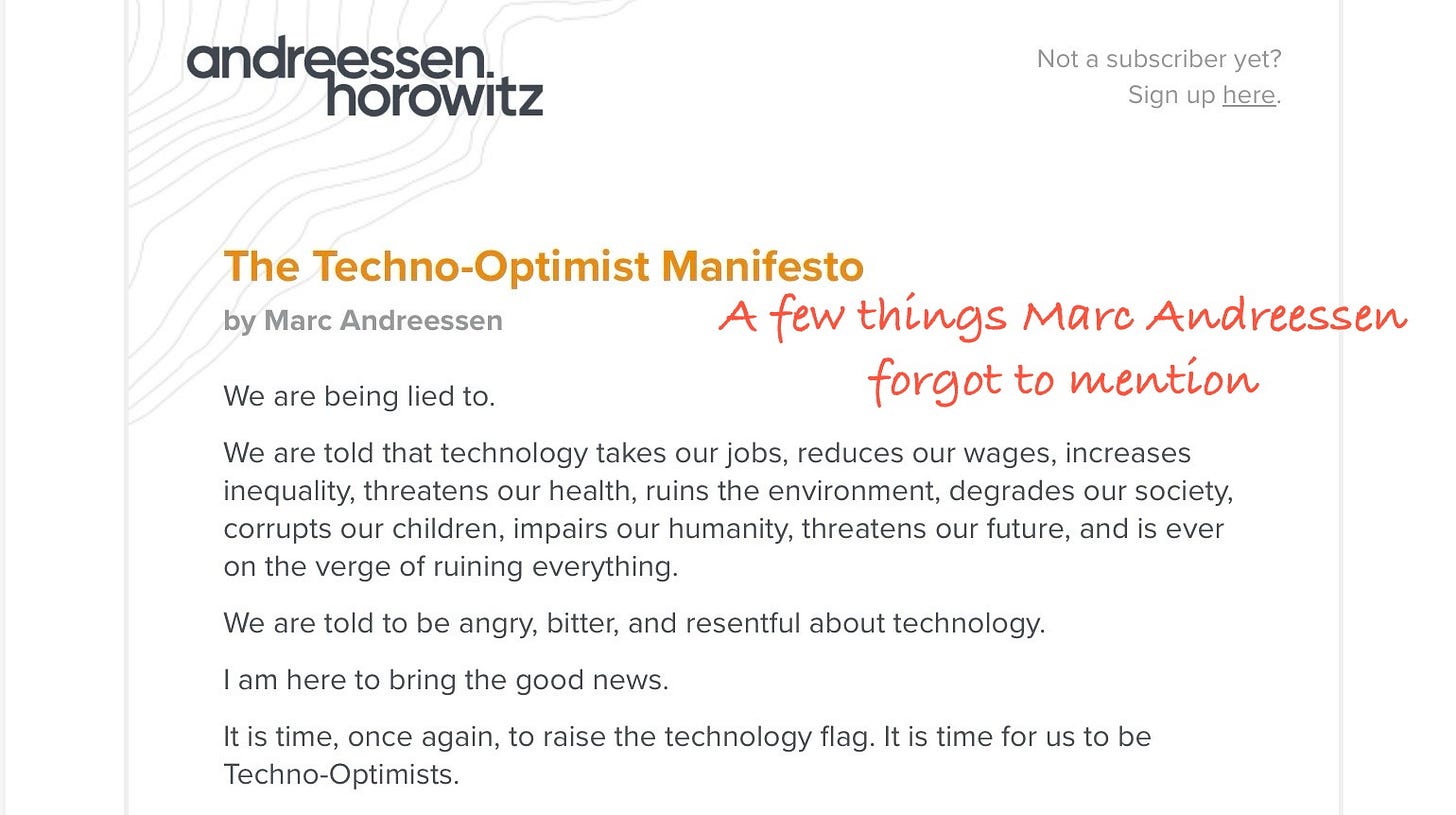Two kinds of Techno-Optimism
A few things Marc Andreessen forgot to mention
Anyone catch Marc Andreessen's "Techno-Optimist" Manifesto?
I admire his unbridled optimism, his yearning for markets to be free, his longing for technologies that could be without restraint, his ability to unabashedly cite 56 of his allies and nobody who disagrees, and, Nixon-like, to confidently declare anyone who disagrees with him to be both immoral and an Enemy, and above all else his absolute certainty in his own ideas.
But not his lack of respect for data, for alternative perspectives, or for people less wealthy or dogmatic than himself. The very idea that the world might focus on sustainable development goals for the sake of the less fortunate puts him in absolute agony.
His statement of beliefs (which includes an assertion that he believes in the scientific method) is declaration, not science, nor reasoned, steel-manned argument.
His 11,000 word manifesto is as remarkable for what it doesn't consider as for what it does. No mention of Cherynobyl, the threat of nuclear war, Thalidomide, or frequent mass casualties from automatic weapons, surveillance capitalism, global warming, or misinformation; no nuance about how, historically, technology sometimes has gone wrong, no acknowledgement that airworthiness regulation keeps airplanes unbelievably safe. Nuclear power is mentioned; the threat of nuclear war is never mentioned. Climate change is not.
In an essay that declares that "we believe in .. liberating people to make their own choices", everyone who makes different choices, economic, social, scientific, or otherwise, is either denigrated or ignored.
In an essay that declares that "we believe in ... testing ideas empirically", not one empirical study is cited.
In the annals of argument, Andreesen's one-side recital of facts is historic. (Bertrand Russell, whom he cites as an ally, would hardly be pleased to be included, either on the grounds of logic or politics).
§
I am a techno-optimist, too, a Founder of two AI companies, someone who has worked on AI since childhood, and who spends every waking moment trying to think about how to achieve a positive outcome. But being long-term optimistic about technology doesn't mean you have to ignore the short-term (or long-term) risks of technology.
It means working to recognize the risks, and working to address them, so that we can reach the positive outcomes that are promised, not casting those who recognize those risks as the enemy. It's mean *working* for a positive future, not just declaring that one is inevitable and hoping for the best.
Gary Marcus is a techno-optimist, but not an Andreesen.
https://a16z.com/the-techno-optimist-manifesto/?utm_medium=email&utm_source=newsletter&mkt_tok=MzgyLUpaQi03OTgAAAGO2BVrjWE_tL3o4OlMtNEihY3jAsMBKQ4k34IBBOtwaPtxN2JReP5PF-FUnXl8mwlkfnNJg-8x7ffoRf40GaU9DFNpBV-TDhDwlD_6fRgT6w


"We had a problem of isolation, so we invented the Internet" is so awful it feels like it must be self-parody.
I'm not a Marxist, myself. Many of his ideas have simply not survived the test of time. Mixed market economy with a strong social safety net for the win, at least for the foreseeable future.
That said, it's interesting how Marc identifies communists as "the enemy" when Marx was one of the first techno-optimists. If anything, I would call that very techno-optimism one of Marx's weaknesses, but either way, automation and technological progress were key to his vision of post-capitalism. ("Capitalism was the best and worst thing to ever happen", in the memorably pithy phrasing of Marxist Fredric Jameson.) Some communists, those I can work with, still remember this tendency of their teacher. Others, like the de-growthers (who fail to realize their project would be a humanitarian disaster) follow a left-wing line of thought born as a reaction to and rejection of both canonical Marxism and liberalism.
For, like, 90% of the world, the delineations between these three squabbling factions with rather porous borders are academic at most. Don't worry if your eyes glazed over. But if you're going to be writing broad, grandiose manifestos, it helps to at least have at least some passing, 101-level familiarity with one of the most influential thinkers of the 19th Century... even if only to better oppose him and and his followers.